Auditor Jim Zeigler announces plan to return portraits of Governors George & Lurleen Wallace to Capitol rotunda
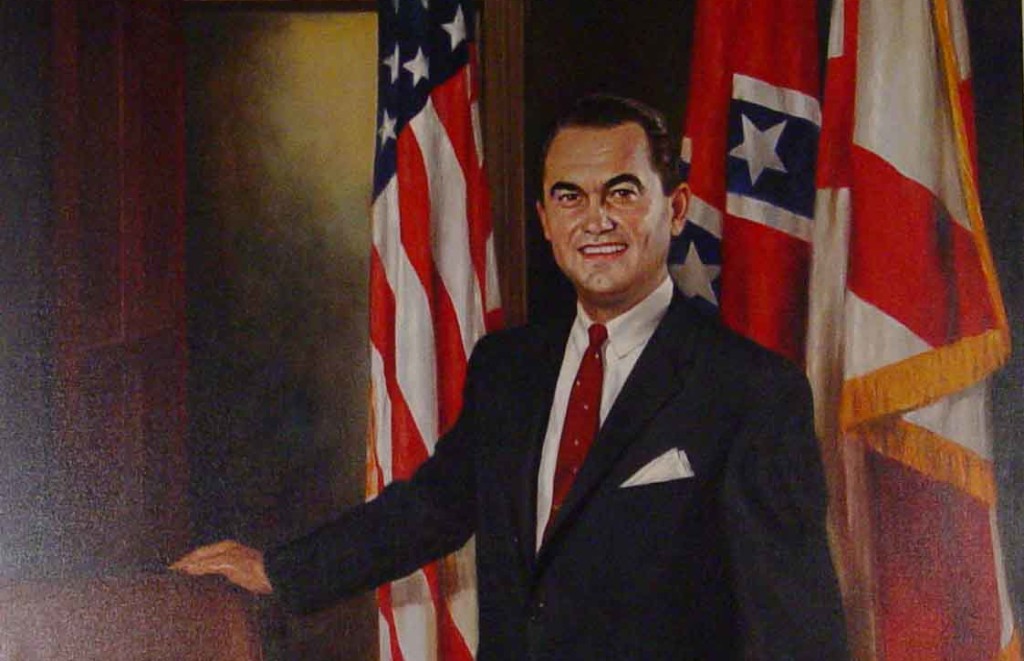
When State Auditor Jim Zeigler addressed the Coosa County Republican Party Tuesday evening, he had a surprising announcement to make – Zeigler told his co-partisans in Rockford that his months-long effort to restore the position of the official portraits of former Gov. George Wallace and and his wife and successor Gov. Lurleen Wallaceb may soon end in victory. Zeigler told the gathering of Coosa GOP-ers his conversations with state officials in charge of historical preservation had “at long last” began to augur progress. “I requested a meeting with the new Acting Director of the Alabama Historical Commission. Because she is a defendant in a pending legal case about the Confederate flag removal, she correctly decided that I should instead meet with the new Chairman of the Commission, Dr. Jim Day of Montevallo,” Zeigler said, telling the assembled crowd he found a receptive audience in Dr. Day. “He has drawn a diagram of my plan to return the Wallace portraits to the rotunda while preserving the spots of the most recent four governors in the second floor rotunda and maintaining the chronological order of the other governors’ portraits,” Zeigler said. “This proposal will be placed on the agenda of a meeting of the Alabama Historical Commission.” “I believe that we are very close to righting this wrong and having the two Wallace portraits returned to where they historically were and legally should be,” he concluded. Zeigler cited a joint resolution – Act. No. 83-57, HJR 10, from February 2, 1983 – passed by the Alabama Legislature which states: BE IT RESOLVED BY THE LEGISLATURE OF ALABAMA, BOTH HOUSES THEREOF CONCURRING, That the official portrait of Governor George C. Wallace is of such significant historical importance that it shall be displayed in the center rotunda of the first floor of the state capitol from this date henceforth. BE IT FURTHER RESOLVED, That a copy of this resolution be sent to Governor Wallace and the Alabama Historical Commission so that they may know of our intent that this historic portrait will be forever displayed. A concurring Act regarding Lurleen Wallace was also passed, a clear sign of the Legislature’s intent on the issue. Zeigler said the news was heartening for those who honor Alabama’s history, and an affirmation the rule of law. “The law is clear. The intent of the legislature is clear,” he concluded. “Some Montgomery bureaucrats decided to revise history and ignore the intent of the legislature to suit their own politically correct agenda. The restoration of the Wallace portraits to the rotunda will right this wrong.”
Anne Dillard: Moving up the nursing education ladder makes a difference

Betty walks into the hospital and works her way through the chairs to the reception desk where she is greeted by a nursing assistant. Betty is a new patient at the clinic. After check-in, Betty is called back by an individual whose name badge says “RN” – registered nurse. Once, Betty is placed in a patient room, she is seen by a family nurse practitioner who is there to discuss Betty’s health concerns and complete her exam. After a complete checkup and tests, the family nurse practitioner describes the results and provides Betty with her new prescriptions. Betty leaves and the various nurses that interacted with her will have charted the visit, which all goes to a physician for final review. This is the healthcare scenario thousands of Alabamians experience every day. It is also the future of patient care in our state. From obesity to diabetes to infant mortality, our state is facing a well-publicized health crisis. A major underlying problem is access to high quality, affordable healthcare. Nurses – at all levels of education – are integral partners of the patient care team. And to make healthcare in Alabama even better, nursing education advancement must be encouraged. My name is Anne Dillard, and I have been nearly every level of nurse mentioned in Betty’s story. More than 25 years ago, I started my career in healthcare because I wanted to make a difference in the community. My entry into the healthcare profession was as an emergency medical technician (EMT) and paramedic near Gainesville, Florida. Workdays consisted of responding to everything from minor symptoms and broken bones to life-threatening injuries. Most calls for help meant assessing the patient’s needs and providing as much care as possible until we could get him or her to the emergency room. While I loved my job, I didn’t want to stop providing care at the hospital’s doors. I wanted to walk through with my patients and see them through their crisis to help them fully recover. I decided to enroll in a local Associate Degree in Nursing (ADN) program to be able to work inside the hospital. At the time, I still had to work while going back to school, and the two-year ADN program provided the greatest flexibility as well as being the most budget-friendly. After earning my degree, I served as a nurse for the next two decades, becoming an expert in caring for my patients. For all practical purposes, I knew how to be a good nurse but I did not fully comprehend the many details of how nurses with more education could change outcomes. As an ADN, I could anticipate my patients’ needs, and I could recognize and care for complex symptoms. However, I did not fully understand as much as I wanted to about a patient’s symptoms or how a particular medicine affected the root cause of the patient’s condition. So I made the decision to continue my education to earn a Bachelor of Science in Nursing (BSN). I enrolled in the ADN-to-BSN program in Alabama while continuing to work at a local hospital. I often found myself questioning my decision. The financial benefits of a BSN versus an ADN were not a real factor when compared to the cost of attendance, and the long nights of studying after a full day of class and work were at times disheartening. But the truth is this: my decision to continue my nursing education was not just about money or extra sleep. It was about providing the best possible care for my patients. After completing my BSN, I can honestly say I am better prepared to understand the complex needs of my patients and to work with other healthcare professionals in a collaborative approach to healthcare. That’s why a 2014 study by the American Association of Colleges of Nursing showed a 10 percent increase in the proportion of nurses holding a bachelor’s degree in an acute care setting was associated with a 7 percent decrease in patient risk after discharge. Today, I have completed my Masters of Science in Nursing (MSN) and am currently enrolled in the Doctor of Nursing Practice (DNP) program in Alabama. The knowledge I gained at each educational step taught me not only more about patient care but also about the important role nurses play in our healthcare system everyday. Investing in continued nursing education does not simply help a nurse receive a degree, it means improving the access to and the quality of care all patients receive. As an experienced nurse in a state facing healthcare crisis, I believe it’s time we do more to help aspiring and current nurses reach their educational goals. That’s why I support organizations like the Alabama Health Action Coalition who work everyday to improve nursing and healthcare in Alabama. By encouraging nurses (and future nurses) in Alabama to advance their educational level we are preparing a strong workforce. These professionals will be ready to make a difference in the lives of more than four million Alabamians who rely on the healthcare system. Anne Dillard began her career in healthcare as an EMT. She is now in a nursing doctoral program.
Jeb Bush: NSA needs broader powers to combat “evildoers”

Republican presidential hopeful Jeb Bush said Tuesday that the government should have broad surveillance powers of Americans and private technology firms should cooperate better with intelligence agencies to help combat “evildoers.” At a national security forum in the early-voting state of South Carolina, Bush put himself at odds with Republican congressional leaders who earlier this year voted to end the National Security Agency’s bulk collection of phone records. The former Florida governor said Congress should revisit its changes to the Patriot Act, and he dismissed concerns from civil libertarians who say the program violated citizens’ constitutionally protected privacy rights. “There’s a place to find common ground between personal civil liberties and NSA doing its job,” Bush said. “I think the balance has actually gone the wrong way.” Bush also said the U.S. should send more troops — he didn’t say how many — and equipment to eastern European nations in response to Russia’s increasingly aggressive posture in the region. He said Russian President Vladimir Putin should know that his “adventurism” comes with “a price to pay.” “Rather than reacting to the bad behavior, I think we need to be more forward-leaning as it relates to what the consequences will be,” Bush said. The remarks were part of Bush’s ongoing efforts to pitch an aggressive foreign policy as he struggles to break out of a crowded Republican presidential primary in which businessman and former television reality star Donald Trump has garnered much of the attention. Pushing a hawkish foreign policy is a staple of Republican presidential politics. The exception is Kentucky Sen. Rand Paul, and even the libertarian-leaning senator has refused to take military action off the table as he argues for a reduced American footprint around the world. Yet for Bush, the discussion comes with particular challenges as he tries to distance himself from former President George W. Bush, the candidate’s brother, who signed the Patriot Act into law and oversaw the 2003 invasion of Iraq. Congress voted in June to end the bulk collection of American telephone records under the Patriot Act, a controversial program that NSA contractor Edward Snowden disclosed publicly in 2013. The Obama administration announced recently that the agency later this year would destroy all the remaining records that already had been collected. Bush doubled down Tuesday on his assertions that there is “no evidence” the data collection violated civil liberties. “I’ve found not one” case, he said. The Privacy and Civil Liberties Oversight Board, an independent bipartisan agency, declared NSA’s phone records collections program illegal in 2014, and a federal court of appeals reached the same conclusion earlier this year. A May analysis from the Justice Department found that FBI agents interviewed by the inspector general’s office “did not identify any major case developments” that came from using Section 215 that allowed the bulk records collection. Bush also criticized private technology firms for using encryption to make it harder for their customers to be surveilled. “It makes it harder for the American government to do its job while protecting civil liberties to make sure evildoers aren’t in our midst,” he said. Noting that companies like Google are getting pressure from customers, Bush said “market share … should not be the be-all-end-all,” and he called for “a new arrangement with Silicon Valley in this regard.” In outlining his policy toward Russia, meanwhile, Bush suggested his approach isn’t too aggressive and, in fact, is a U.S. duty as a member of NATO. “It’s not being bellicose to say what you’ll do if someone acts in a way that creates a threat to your allies,” he said. “That’s not warmongering.” Quite the opposite, Bush concluded: “History is full of examples of appeasement, pulling back and creating greater risk than standing up for your friends and allies.” Republished with permission of The Associated Press.
Alabama business roundup: Headlines from across the state

Here’s a roundup of some of the weekend’s top business headlines from across the state: Alabama Newscenter: Kamtek expansion to swell to $530 million, create 354 jobs Kamtek International officials said today the company’s Birmingham expansion plans will total $530 million in capital investment and add 354 jobs by 2019. The automotive supplier won Birmingham City Council approval this morning to purchase 78 acres in Valley East Industrial Park where it plans to build an $80 million, 148,000-square-foot high-pressure aluminum casting plant, creating an initial 120 jobs. That plant is set to be completed by July 1, 2016, in time to start producing parts by the end of that year. The project could grow to 400,000 square feet by 2025, Kamtek officials said. The subsidiary of Canadian-based automotive supplier Magna Ltd. has operated and expanded its stamping and assembly operations in the industrial park multiple times since locating there as the former Ogihara in 1997 to supply Mercedes-Benz in Vance. Magna purchased Ogihara in 2008. Since the purchase, Kamtek has invested $473 million in Valley East Industrial Park, including the purchase of the vacant Del Monte warehouse and its 36 acres three years ago. Employment at the facilities has bloomed from 293 employees at the time of the Ogihara purchase to 922 today. But officials said today more expansions are coming to the existing facilities. The investment eventually could top $530 million and create 354 jobs Magna/Kamtek is one of the largest automotive suppliers in the world and it manufactures and supplies exterior and structural welded assemblies from its Birmingham facility to Mercedes-Benz U.S. International in Vance and several other automakers in the state and the Southeast. The Alabama Department of Commerce, the City of Birmingham Mayor’s Office of Economic Development, the Jefferson County Commission, Jefferson County Economic and Industrial Development Authority, the Birmingham Business Alliance and Alabama Power worked closely with Kamtek to finalize expansion plans. Kamtek has said it intends to use AIDT, the state’s workforce development entity, to prepare new hires to work at the plant. “The expansion of Kamtek is yet another sign that the Birmingham region is a great place for advanced manufacturing facilities to locate and grow,” said Alabama Power CEO Mark Crosswhite, chairman of the board of the BBA. “Our city and our region are drawing companies from across the globe because of our superior workforce, excellent infrastructure, competitive costs, quality of life, and the outstanding level of support and cooperation we offer to business and industry.” Kamtek said it hopes to start construction within the next few weeks in order to complete the new plant next summer. Birmingham Business Journal: Bham City Council approves minimum wage increase to $10.10 in 2017 The Birmingham City Council on Tuesday passed an ordinance to increase minimum wage in the city to $10.10 an hour by July 2017. The measure was proposed by Council President Johnathan Austin, who called for wages to increase to $8.50 in July 2016 and $10.10 in July 2017, according to a report from Fox 6. Alabama currently has no set minimum wage. The federal minimum wage of $7.25 is applied statewide. The ordinance also calls for minimum wage in the city to rise annually as the city’s cost of living goes up. This comes after council members on Aug. 6 voted to increase the salaries of council members from $15,000 to $55,000 in 2017, following the next city council election. AL.com: Alabama trucking company to pay $113,000 to workers after investigation An Alabama trucking company has been ordered to pay $112,735 to employees after a federal investigation found them guilty of failing to pay its workers overtime. The Department of Labor’s Wage and Hour Division found that Fitzhugh Contracting LLC, a logging and trucking contractor, paid 63 workers their regular pay rate, when the Fair Labor Standards Act requires that hourly workers receive their hourly rate plus half for all hours worked past 40. “Employers need to understand and be aware that it is unlawful to underpay employees, misclassify them as independent contractors, or pay straight time for overtime to increase their profit margin,” Frank McGriggs, the Wage and Hour Division’s deputy regional administrator in Atlanta, said in a statement. “Other employers who may be paying workers in a similar manner should take note of this investigation and change their practices immediately.” Fitzhugh Contracting LLC is located at 30513 Highway 43 S. in Gallion. The investigation also found that Fitzhugh misclassified 46 workers as independent contractors, which denied them certain wages and benefits. Fitzhugh also didn’t keep accurate records of hours worked. Fitzhugh agreed to pay $56,367 in back wages plus the same amount in damages, bringing the total to $112,735. AL.com: Alabama Revenue Department makes online tax payments more secure for retailers The Alabama Department of Revenue is taking steps to make its online taxpayer portal more secure. The site, My Alabama Taxes, or MAT, allows retailers to file state and some city and county sales, use, rental and lodging taxes while online. The system was launched in 2013 and, starting in July, will include additional security processes. Now, users of MAT will be required to enter their log-on and password as well as a second entry that will require users to have an authentication code. Users will have an option of receiving the authentication code via text message or email. Commissioner Julie Magee said while MAT is already a secure system, the boost will give users additional assurances their data is protected. The code will be used to verify the user’s identity when logging on to MAT. Users will also be able to check a “trust this computer” box so that it will be saved for future log-ons. ADR has also provided a video showing users a demonstration of the new system. Opelika Now: Plenty of success stories among Alabama businesses Last week we discussed the legendary story of Aflac. Three more remarkable business success stories are just as magnificent. Again, all three of these companies are Alabama born and raised fairytale ventures. Alfa is Alabama’s
Marco Rubio’s Iowa return dampened by thunder, on-and-off showers
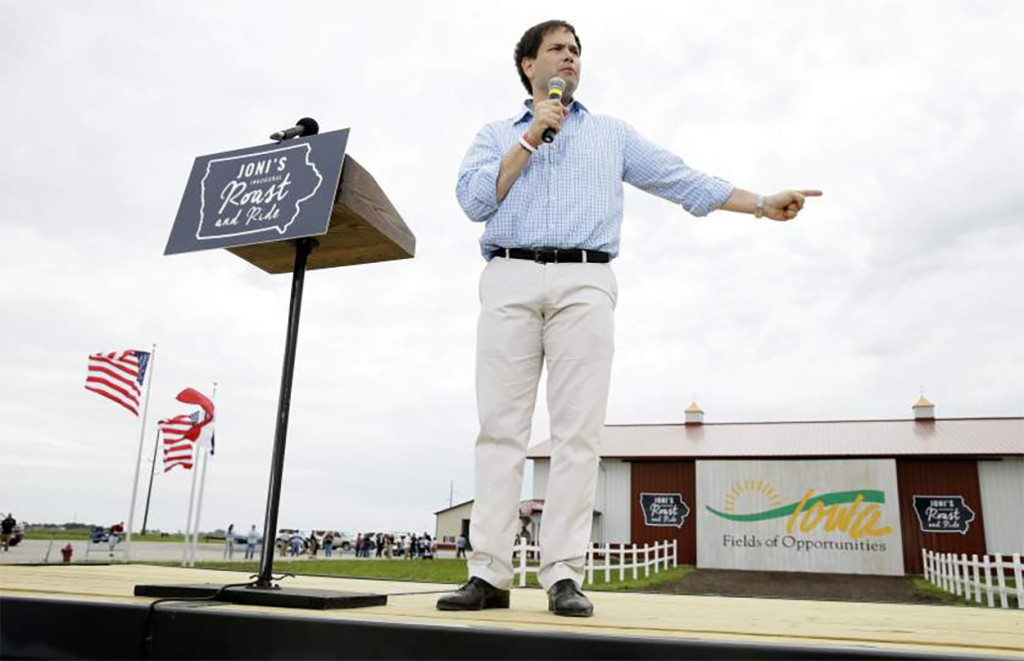
The latest from the presidential candidates as they meet and greet voters at the Iowa State Fair (all times are local): 10:40 a.m. On-and-off downpours are dampening Republican presidential candidate Marco Rubio‘s return to Iowa after about a month away from the lead-off caucus state. Rubio thanked a huddled, umbrella-covered audience for “braving the rain” at the fair’s Political Soapbox, a regular attraction sponsored by The Des Moines Register. The Florida senator has lost ground in national polls since billionaire Donald Trump entered the race in June. Rubio attributes his slip in national polls and recent absence from Iowa and lead-off primary state New Hampshire to duties in the Senate, fundraising and visiting other states. “We love coming to this state. We were here last night,” Rubio said, describing his evening of midway rides and a funnel cake with his wife and children at the fair. Pledging to try to win in Iowa, Rubio told reporters, “We look forward to coming back quite often, especially as we get closer to the caucuses,” scheduled for Feb. 1. Republished with permission of The Associated Press.
Donald Trump leads Jeb Bush 24% -13% in new CNN national poll

A CNN/ORC national poll released Tuesday morning shows that even after his uneven performance at the first GOP debate and subsequent controversy with Fox News’ Megyn Kelly, Donald Trump remains the dominant candidate in the Republican presidential race, getting 24 percent of the vote. Jeb Bush is second with 13 percent. Retired pediatric neurosurgeon Dr. Ben Carson is third with 9 percent. Marco Rubio and Scott Walker are next at 8 percent. Rand Paul is at 6 percent. Ted Cruz, Carly Fiorina and John Kasich are at 5 percent, and former Arkansas Governor Mike Huckabee is in tenth place with 4 percent. Bush has seen his favorability ratings drop since Trump’s entry into the race. He held the top spot in the field in most CNN/ORC polls between last fall and Trump’s entry into the race in June. Overall, 56 percent hold an unfavorable view of the former Florida Governor, and 42 percent of Republican voters have a negative impression. That’s an increase in negative views among all adults (up from 43 percent since July) and among Republican voters (up from 34 percent unfavorable). As has been the case with Trump in most polls since he surged to the lead in every poll taken over the past month, there are still downsides for the New York City businessman/celebrity. A majority of Republicans – 58 percent – say the party would have a better chance to win in 2016 with any candidate other than the former Celebrity Apprentice star being the nominee – and that’s the case with 72 percent of those who currently aren’t supporting Trump. However the pollsters say that Trump is impressing on a variety of other questions asked in the survey. The poll shows that 45 percent say that they trust Trump more than any other Republican candidate on the economy — up 25 points since June, 44 percent say they trust Trump over the others on illegal immigration — up 30 points since June — and 32 percent trust him most to handle ISIS, no other candidate comes close on any of these issues. On the economy and illegal immigration, Trump is far and away the top choice even among those Republicans who support someone else for the nomination (33% who say they will most likely vote for someone else say Trump is their most trusted on the economy, 29% say so on illegal immigration). Trump is also most trusted on social issues, 19% say he’s their top choice to handle that. Bush follows at 15%. The CNN/ORC Poll was conducted by telephone Aug. 13-16 among a random national sample of 1,001 adults. The sample included 466 registered voters who are Republicans or independents who lean toward the Republican Party. For results among those Republican voters, the margin of sampling error is plus or minus 4.5 percentage points. For results among the full sample, it is 3 points.
Fresh from Iowa State Fair, Jeb Bush announces busy multi-state fundraising tour

Now that the traditional Iowa State Fair food fest and political cattle call has concluded, Republican candidate Jeb Bush released his late-summer fundraising schedule. The former governor will be launching a busy multi-state tour through September 15. According to the National Finance Calendar obtained by Florida Politics, Bush and family members – including his brother, former President George W. Bush — will appear at a variety of meet-and-greet receptions starting Tuesday. The tour will include stops in Georgia, Massachusetts, Florida, Alabama, Virginia, the West Coast, both North and South Carolina, as well as several cities in New York State. August 18 – Evening Reception – Atlanta, Georgia. August 20 – Evening Reception – Nantucket, Massachusetts. August 21 — Luncheon with Mrs. Columba Bush — Charleston, South Carolina. August 22 — Evening Reception of Mission Next – Young Professionals with Jeb Bush, Jr. and Woody Johnson, Jeb 2016 National Finance Chairman — East Hampton, New York. August 24 – Luncheon Reception — McAllen, Texas; Evening Reception — Denver, Colorado. August 25 — Luncheon Reception — Salt Lake City, Utah; Evening Reception of Mission Next – Young Professionals with Jeb Bush, Jr. — Jacksonville, Florida. August 26 — Breakfast Reception — Birmingham, Alabama. August 27 — Breakfast Reception — Greensboro, North Carolina; Evening Reception — Richmond, Virginia. August 28 – Luncheon Reception — Virginia Beach, Virginia; Evening Reception — Southampton, New York. August 29 — Breakfast Reception — Sagaponack, New York; Luncheon Reception — Quogue, New York; Afternoon Reception — Wilmington, North Carolina. August 31 — Evening Reception — Miami, Florida. September 9 — Evening Reception — Boston, Massachusetts. September 10 — Luncheon Reception with President George W. Bush — New York, New York. September 14 — Evening Reception — Seattle, Washington. September 15 — Luncheon with Mrs. Columba Bush and Jeb Bush, Jr. — Los Angeles, California; Evening Reception — Portland, Oregon. Additional details on times and locations of any of the fundraising events is available by emailing finance@jeb2016.com. Bush also unveiled a proposed plan to support American veterans once he is elected president, a Veteran Affairs reform effort that includes expanding options for health care outside Veterans Administration without cutting funding for VA hospitals and medical staff. Bush’s proposal would “keep America’s promise to our veterans,” which he believes is the top priority for the next President of the United States. The full plan is online here. Also on Monday, Bush visited Columbia, South Carolina to meet with veterans and attend a town hall presented by the Concerned Veterans for America. Prior to the event, Bush announced the endorsement of 12 individual Medal of Honor recipients, which Fox News called “15 percent of all living recipients of the nation’s highest military honor.”
Marco Rubio’s slow start in Iowa, New Hampshire puzzles GOP
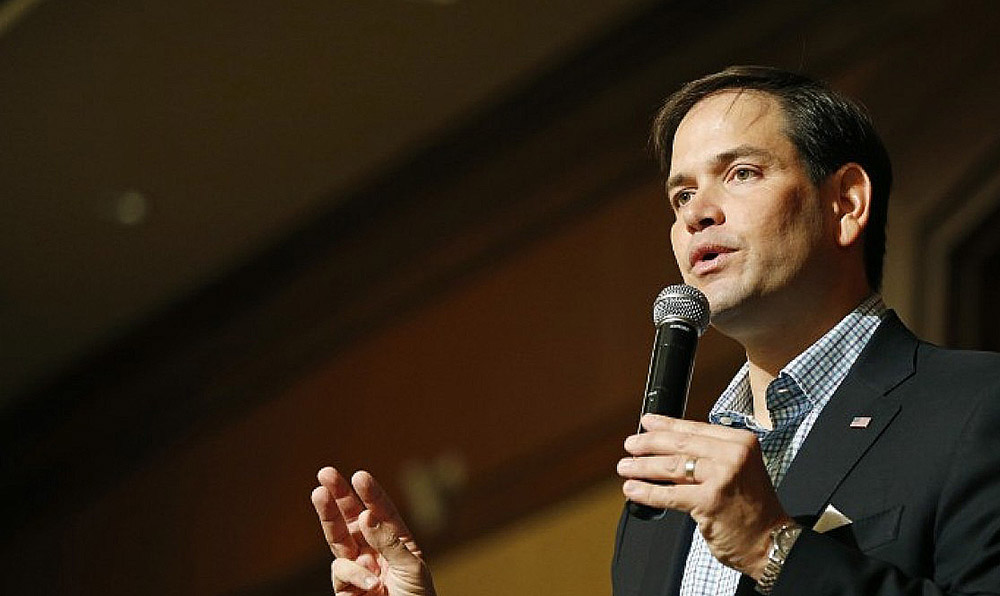
Republican presidential hopeful Marco Rubio‘s slow-go campaign strategy is puzzling party operatives in Iowa and New Hampshire, states where voters are used to candidates showering them with attention early and often. While some GOP hopefuls are already highlighting their progress toward visiting all of Iowa’s 99 counties, Rubio’s return to the state this week marks his first stop in the caucus battleground in a month. The Florida senator hasn’t traveled to New Hampshire, home to the first-in-the-nation primary, since July 4, though he is expected to return before the end of August. “You’ve had some of the others who have worked it a lot harder,” said Richard Schwarm, a former Iowa GOP chairman who is uncommitted in the 2016 race. “I don’t think it’s too late. But I think he should step up the appearances here because we are wide open.” Fergus Cullen, a former New Hampshire GOP chairman who has yet to back a candidate, said that while Rubio benefits from “goodwill and interest,” his infrequent appearances in the state have cost him early endorsements. “He would have more if he spent more time here,” Cullen said. Rubio has visited New Hampshire just three times since announcing his campaign in early April. His stop in Iowa this week marks his fifth trip to the caucus state as a candidate. The senator’s advisers say they see little reason to worry about early state grumbling at this juncture in the campaign. Even after a burst of momentum following his campaign launch and a strong performance in the first GOP debate, Rubio’s team has said it doesn’t expect the young senator to surge until fall or even winter, when voters start paying more attention to the White House race. However, early polling shows Rubio has lost ground this summer while billionaire businessman-turned-presidential candidate Donald Trump has surged, in part by tapping into the public’s anger with Washington. Like some of his rivals, Rubio has spent much of the summer rounding up enough campaign cash to stay competitive in a lengthy primary. Rubio’s campaign and outside groups supporting him raised a combined $45 million through the second quarter, a strong number but well below the massive haul from former Florida Gov. Jeb Bush, who brought in more than $100 million. “We don’t expect to have the most money, but we will be competing in all 50 states,” said Alex Conant, the campaign’s spokesman. Rubio, a first-term senator, has also eschewed the campaign trail at times for hearings and votes on Capitol Hill, where he’s still taken heat for being absent often since launching his White House run in April. He returned to Washington the day after his campaign launch for a vote on giving Congress a say on President Barack Obama‘s Iran deal. He also skipped an in-person appearance at a New Hampshire candidate forum earlier this month to vote on legislation to defund Planned Parenthood. He participated in the forum via video instead. Rubio, a 44-year-old son of Cuban immigrants, is seen by some Republicans as a bright hope for a party desperate to attract younger, more diverse voters. His optimistic, future-focused campaign message already has some Democrats worried that he would be a formidable general election opponent for front-runner Hillary Rodham Clinton. “I think he’s a rising star in the Republican Party,” Iowa Gov. Terry Branstad said. “I think it would be worth his time to spend a significant amount of time in the state of Iowa.” Some of Rubio’s rivals have devoted more time to the early voting states this summer. Bush, who is counting on a strong performance in New Hampshire to propel his White House hopes, has made six trips to the state since announcing his campaign in mid-June. Ohio Gov. John Kasich has only officially been in the race for a month, but he has already matched Rubio’s travel to New Hampshire. Of course, face time doesn’t always guarantee electoral success. Former Pennsylvania Sen. Rick Santorum turned his intense focus on Iowa into a surprise victory in the caucuses in 2012. But his attempts to repeat that strategy four years later are showing little sign of success. Former Texas Gov. Rick Perry is also blanketing Iowa, but he has struggled in early polling. Rubio was returning to Iowa this week for an appearance at the state fair Tuesday and the opening of his campaign headquarters in Des Moines on Wednesday. Conant said Rubio would also make stops in New Hampshire, as well as South Carolina and Nevada, by the end of the month. Republished with permission of the Associated Press.
Governor Robert Bentley made appointments to 13 different boards, commissions
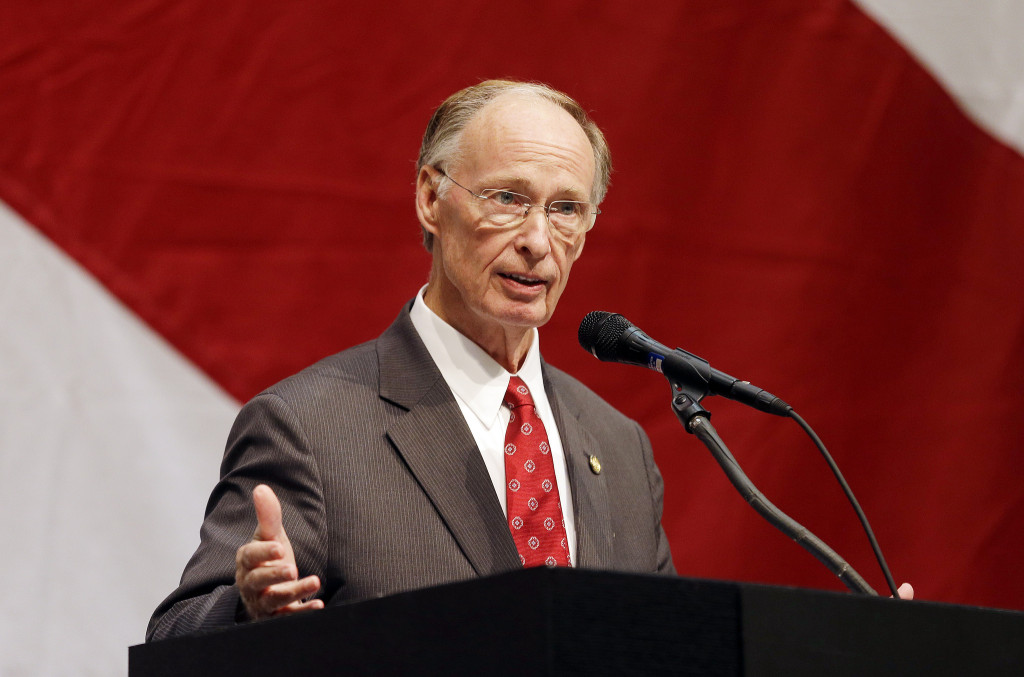
Governor Robert Bentley‘s office reports that he did not make appointments during the session. Last weeks appointments list includes 13 boards and commissions with the majority of them going to the relatively new Advisory Board on Broadband. You can find more information on open board positions on the appointments webpage. Etowah County District Attorney Jody Willoughby Mobile County District Judge Jill Phillips Southern Regional Education Board Chuck Smith Drought Assessment Planning Team Matthew Durdin Chris Isaacson Roy McAuley Alabama Commission on Higher Education Randy McKinney Alabama Housing Authority Michael Toles Alabama Medical Licensure Board L. Daniel Morris Prison Reform Task Force Franklin Johnson State Advisory Group for Juvenile Justice and Delinquency Prevention Baker Allen SEARCH Law Enforcement Commission Daniel Urquhart Board of Registration for Architects Daniel Bennett AWAWG FAP Alexia Borden Allison Jenkins Advisory Board on Broadband Dr. Alec Yasinsac Gary R. Bolton Quincy P. Minor Jason Walker Tim Lewis Ben Venable Lisa Volpe McCabe Richard Wolfe Tami Reist Jimmy R. Copeland Bill Dean Kevin Harris William Stimpson Hanes Tomi J. Selby Will Choat Nancy C. Pack Bill Gillespie Sonny Brasfield John M. Wade John Clyde Riggs Jason Jackson Jeremy L. Arthur George Ford George Stegall David Cole John Schremser C. Wayne Hutchens John C. Nettles Taylor Vice Bill Johnson Betty Willis
Probe of Hillary Clinton’s server could find more than just emails

Now that federal investigators have Hillary Rodham Clinton‘s homebrew email server, they could examine files on her machine that would be more revelatory than the emails themselves. Clinton last week handed over to the FBI her private server, which she used to send, receive and store emails during her four years while secretary of state. The bureau is holding the machine in protective custody after the intelligence community’s inspector general raised concerns that classified information had traversed the system. Questions about her use of the server have shadowed her campaign for the Democratic presidential nomination. Clinton again this weekend repeated a carefully constructed defense of her actions, in that she did not send or receive emails marked classified at the time. But her emails show some messages she wrote were censored by the State Department for national security reasons before they were publicly released. The government blacked out those messages under a provision of the Freedom of Information Act intended to protect material that had been deemed and properly classified for purposes of national defense or foreign policy. What hasn’t been released: data that could show how secure her system was, whether someone tried to break in, and who else had accounts on her system. A lawyer for Platte River Networks, a Colorado-based technology services company that began managing the Clinton server in 2013, said the server was provided to the FBI last week. Indeed, many physical details of the server remain unknown, such as whether its data was backed up. In March, The Associated Press discovered that her server traced back to an Internet connection at her home in Chappaqua, New York. A computer server isn’t a marvel of modern technology. Just like a home desktop, the computer’s data is stored on a hard drive. It’s unclear whether the drive that Clinton used was thoroughly erased before the device was turned over to federal agents. If it had been, it’s also uncertain whether the FBI could recover the data. Clinton’s lawyer has used a precise term, “wiped,” to describe the deleted emails, but it was not immediately clear whether the server had been wiped. Such a process overwrites deleted content to make it harder or impossible to recover. An FBI spokesman declined to comment. Investigators who examine her server might find all sorts of information – how it was configured, whether it received necessary security updates to fix vulnerabilities in software, or whether anyone tried to access it without permission. Running a server is akin to her messages being stored inside an office file cabinet. But while a file cabinet only yields the documents stored inside, a server can also offer information about the use of that data over time: Who had access to the filing cabinet? Did anyone try to pick the lock? Did the owner attempt to alter the files in any way? And who was given keys to the building in the first place? Since her server was first installed in 2009, it most likely used a traditional hard disk-based device rather than a newer solid state unit that only has become commonly used in the last two or three years, said computer scientist Darren Hayes. Solid state drives, until recently, were much more expensive than their counterparts for storing lots of data. Forensics experts would then have an easier time retrieving erased data because such older, disk-based servers are not as efficient in deleting material, said Hayes, assistant professor and director of cybersecurity at Pace University’s School of Computer Science and Information Systems in New York. “A hard disk drive is very difficult to manipulate,” he said. “Once you get your hands on a hard drive, there’s a lot you can recover.” Even after files are marked for deletion on a disk, Hayes said, their contents remain on the drive and can be retrieved. Even if the full file is gone, fragments can be pulled off the drive. Sometimes a complete email file even can be found inside other files marked for deletion. Clinton said in March that she had exchanged about 60,000 emails during her four years in the Obama administration, about half of which were personal and deleted. She turned over the others to the State Department, which is reviewing and releasing them on a monthly basis. Last month, the inspector general for the nation’s intelligence community warned that some of the information that passed through Clinton’s server was classified information. It’s generally not possible to forward or cut-and-paste an email marked classified to a private account because classified email systems are closed to outsiders. But it can be illegal to paraphrase or retype classified information from a secure email into an unprotected message sent to a personal address. Hayes said forensics experts could, in most cases, determine whether the server used encryption to transmit emails, which would be important in learning whether her occasional email discussions of classified and sensitive matters might have been vulnerable to hackers and snooping by foreign governments. The server’s internal registry could also provide hints of whether hackers penetrated the server’s security. “They may have deleted a lot of data, but there’s a lot of data that a good forensics team would be able to recover,” he said. Republished with permission of The Associated Press.
GOP hopeful Scott Walker offers health plan with tax credits
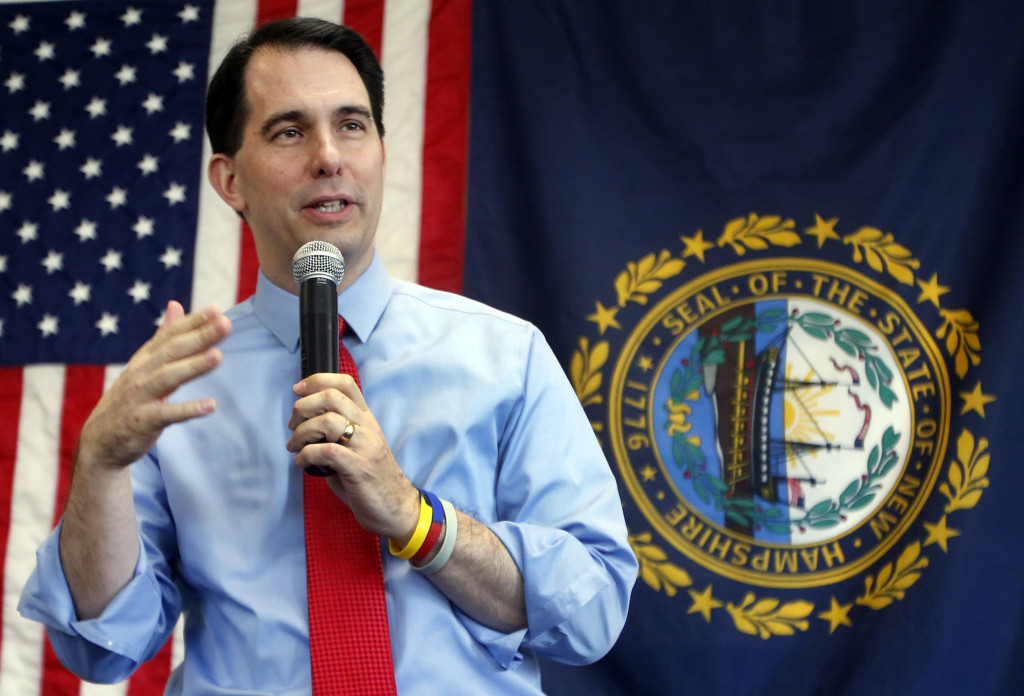
Republican presidential candidate Scott Walker‘s plan for replacing President Barack Obama‘s health care law would extend refundable tax credits to help pay for private health insurance based on age instead of income, restructure Medicaid and allow people to shop for insurance across state lines. The Wisconsin governor provided details of his proposal to The Associated Press in advance of a Tuesday speech in suburban Minneapolis where he was to outline his first major policy initiative of the presidential campaign. Walker’s plan does not include cost figures or an estimate of the number of people who would be covered, making it nearly impossible to compare with current law. For the period from April to June of this year, 11.4 percent of U.S. adults were uninsured, which translates to about 16 million people gaining coverage since the rollout of Obama’s health care law in 2013. Walker’s campaign said the plan would be paid for by eliminating $1 trillion in taxes that are levied under the current law and by making other changes to Medicaid and how health insurance is taxed. The Supreme Court in June upheld a key portion of the Affordable Care Act allowing for federal subsidies to defray the cost of coverage, a major defeat for opponents of the law. Walker and other Republican candidates have insisted they would repeal the law, starting on the first day of a GOP presidency. The biggest hurdle Walker, and any opponent of the law, faces is getting it repealed. That would take 60 votes in the Senate, and Walker’s plan does not address how he would undo the law in any other way. Walker, in excerpts of his speech released by his campaign, blamed fellow Republicans with not doing enough to repeal the law. “Republican leaders in Washington told us during the campaign last year that we needed a Republican Senate to repeal Obamacare,” Walker said in the prepared remarks. “Well, Republicans have been in charge of both houses of Congress since January and there still isn’t a bill on the president’s desk to repeal Obamacare.” Topher Spiro, vice president for health policy at the Center for American Progress, a think tank often aligned with the White House, said Walker’s plan would be a step backward. “The math only adds up if he’s slashing Medicaid and increasing taxes on middle-class people with employer plans,” Spiro said. While the Walker plan would repeal the Affordable Care Act, it appears to use some similar kinds of tools to promote coverage. For example, there would be no requirement for individuals to carry health insurance or face fines, as there is currently. But, in order to be guaranteed affordable coverage without regard to pre-existing medical problems, individuals would have to “maintain continuous, creditable coverage.” There’s merit to Walker staking out his position on the issue, even though he doesn’t explain how the law would be repealed, said economist Douglas Holtz-Eakin, president of the American Action Forum, a center-right think tank. “There’s a lot of this that is fairly standard conservative health policy reform,” Holtz-Eakin said. “The basic plan looks familiar.” Walker, similar to current law, would also provide tax credits to help with the cost of coverage for people whose employers don’t offer insurance. But unlike current law, those credits of between $900 and $3,000 would be based on age and not be keyed to a person’s income. So they may not help low- to moderate-income people as much as the existing tax breaks do. Walker’s plan calls for eliminating unspecified regulations in the current law, a move that Walker claims would lower premiums by 25 percent. Other elements of the plan would include extending a $1,000 refundable tax credit for anyone who signs up for a health savings account, allowing people to shop for health insurance across state lines, reorganizing Medicaid into smaller programs, and giving states more regulatory authority. He would also allow for new health insurance purchasing agreements and deregulate the long-term care insurance market. The reality of outright repealing the law as Walker wants to do is stark: Doing away with it completely would kick 19 million people off insurance in the first year, according to the Congressional Budget Office. Walker isn’t the first Republican to put forward a detailed plan for replacing Obama’s law. Louisiana Gov. Bobby Jindal released his plan last year and Florida Sen. Marco Rubio outlined his approach in an opinion piece published Monday. And while alternatives have been introduced in Congress, none has gotten traction as Republicans have yet to coalesce around any particular idea. Republished with permission of The Associated Press.
Donald Trump immigration proposal divides GOP presidential field

Donald Trump is dividing his Republican presidential rivals anew with his call to rewrite the Constitution to crack down on millions of immigrants living in the U.S. illegally, and to force Mexico to pay for a better border fence. Scott Walker embraced some of the plan Monday, but other contenders, such as Chris Christie and Carly Fiorina, dismissed elements as unworkable. Trump’s immigration proposal, his first formal policy plan since announcing his candidacy in June, won praise Monday from the GOP’s conservative tea partyers, some of whom favor changing the Constitution to reverse the “birthright citizenship” guaranteed to anyone born in the United States, no matter the status of their parents. At the same time, surveys show a majority of Americans, including Republicans, support allowing many immigrants in the U.S. illegally to stay. Trump leads his Republican rivals in national polls, and his proposal quickly reverberated within the party, which has struggled with the issue of immigration. Party leaders are determined to expand the GOP’s appeal with Hispanics after the 2012 election in which Mitt Romney won just 27 percent of the Latino vote. But many Republicans have adopted a hardline approach on immigrants, appealing to the party’s core voters who play an oversized role in nominating primaries and caucuses. Asked at the Iowa State Fair on Monday if he supports building a wall along the U.S. Mexican border, as Trump has proposed, Wisconsin Gov. Walker gave a quick “yes,” but he declined to address whether he supports deporting children of parents in the country illegally. “Going forward, the best thing we can do is enforce the law,” he said. Walker, who reversed his position in April on allowing a chance for legal status for those in the country illegally, also gave mixed answers on ending birthright citizenship. Christie said during a CNN interview that a wall or fence along parts of the border, especially in more urban and difficult-to-control areas, was conceivable, but “not the entire border. Doesn’t make any sense.” Likewise, the New Jersey governor is opposed to requiring Mexico to pay for the construction, saying Trump’s suggestion “makes no sense.” “And this is not negotiation of a real estate deal, OK. This is international diplomacy and it’s different,” Christie said, noting Trump’s line of business. Former Hewlett-Packard CEO Carly Fiorina called Trump’s wall plan, “completely unrealistic.” Trump wasn’t flinching Monday. “The wall will work,” he said when he arrived for jury duty in New York and a passer-by at the courthouse asked about the idea. He spent much of the day like other prospective jurors, filling out forms and waiting to see if he would be picked. In the end, he wasn’t. Like Trump’s early derogatory campaign statements about immigrants, his new plan has lit up angry conservatives. But it also has annoyed Republicans who see the nation’s growing Latino population as an opportunity to demonstrate sensitivity to minorities who have voted overwhelmingly Democratic in recent presidential elections. Tea party movement co-founder Mark Meckler said Trump’s “position on deportation generally reflects what likely voters think. Trump is dealing head-on with the difficult issues while more establishment candidates fret over focus groups and polls.” Trump also is calling for eliminating federal aid to “sanctuary cities,” such as San Francisco, where local officials have decided not to use their police to enforce some federal immigration laws. The position is also supported by former Florida Gov. Jeb Bush. Like Christie, however, Bush differs sharply with Trump on other aspects of immigration policy. Though he didn’t chime in specifically on Trump’s new proposal, Bush supports allowing people in the country illegally who have not committed major crimes, who work and follow a course such as learning English and paying fines, to stay in the United States. In a late July Wall Street Journal/NBC News poll, 64 percent of Americans said they support either a path to permanent legal status or citizenship for immigrants in the country illegally. According to the poll, a small majority of Republicans fall into the same category. South Carolina Sen. Lindsey Graham, also speaking at the fair, called Trump’s proposal “gibberish,” but warned it also sends a hostile signal toward Latinos voters. “You’re not going to get 11 million people and drive them back out of this country,” he said. “That’s just not practical. That’s going to kill the Republican Party.” Though Ohio Gov. John Kasich supports building a wall, he, like Bush supports maintaining birthright citizenship and allowing a pathway to legal status for immigrants. “They are a very important part of most of our communities,” Kasich said in South Carolina. “For the bulk of them, they are God-fearing, good, hardworking people, and they are a part of our country now.” Fiorina said to change birthright citizenship would be rigorous. “It would take passing a constitutional amendment to get that changed. This is part of our 14th Amendment, and so honestly I think we should put all of our energies, all of our political will over finally getting the border secured and fixing the legal immigration system.” Republished with permission of The Associated Press.

